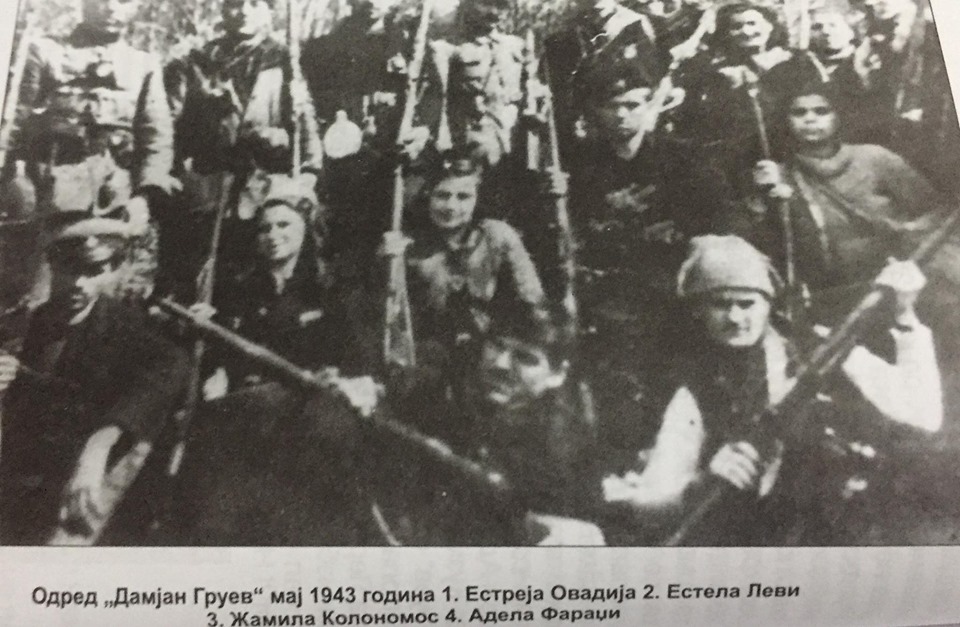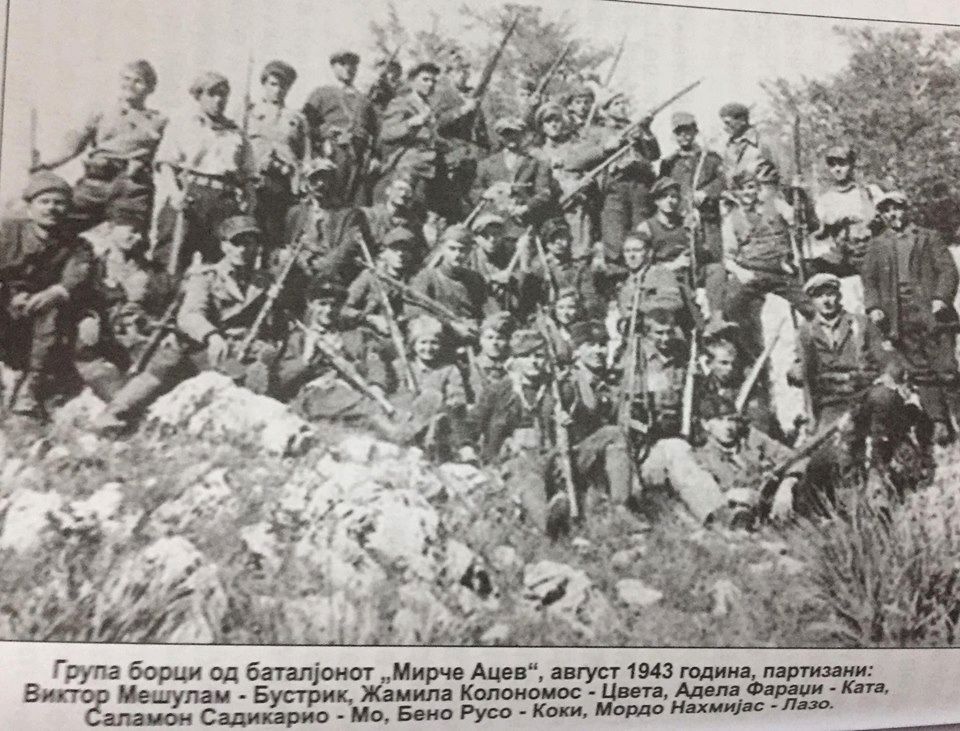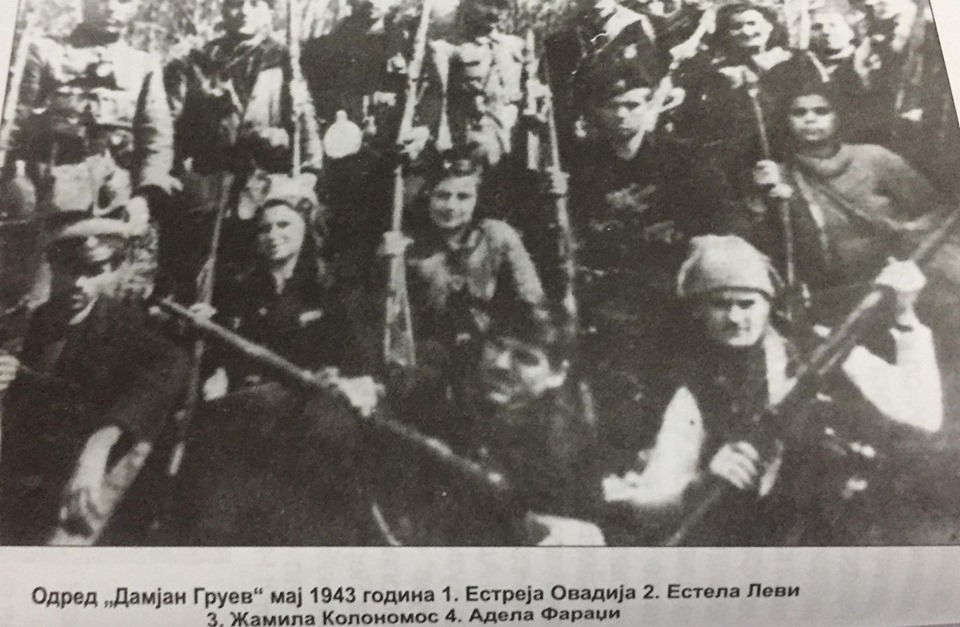ADELA FARADZI - KATA

Jewish women were also involved in the general anti-fascist struggle in Bitola, and this included adults and very young people. While the adults made their apartments available for illegals, meetings, etc., the younger ones, as candidates or members of SKOJ, worked according to specific tasks. These tasks were mainly liaisons, handing out leaflets, knitting, patching, sewing clothes, collecting money, and the youngest were keeping watch at the place where the illegal meeting would be held. Adela Mushon Faraji was among the young people who were part of these activities. The resistance was on the rise in 1942, and the biggest problem was providing housing for the illegals, the party equipment and for meetings. Vancho Prke-Sermen from Shtip and Dimche Milevski-Dobri from the village of Nizhopole lived temporarily in the apartment of Adela Faradzi, as illegals. The five Jewish women managed to escape the Bulgarian army that was carrying out the deportation waited to be rescued and to leave with the partisans. Bogoja Siljanovski received them in his shop where he was selling cigarettes, right next to the police precinct. The five girls, Zhamila Kolonomos, Estreja Ovadia, Adela Faradzi, Estela Levi and Rosa Kamhi, were squatting in 3 square meters space next to each other to warm up. They ate only a few times a month and drank water once a day. Adela Faradzi laughed and cried at the same time, and Estreja was covering her with her coat. When Bogoja heard the screams, he started knocking with the crutches and talking loudly so they are not discovered by the agents who were buying cigarettes from him. After a month of living in the store, they decided to send the girls to the partisans. Shortly after leaving the Bogoja store, Rosa Kamhi got lost in one of the streets where she was supposed to meet the liaison. After another extremely uncertain night, the four Jewish women managed to unite with the partisans, and the “Lily Marlene” song was their password. All those who helped the Jewish women were arrested, including Rosa Kamhi. The four Jewish women and a girl from the village of Lavci, Fana Kochovska-Cvetkovic, arrived in the “Dame Gruev” detachment in April 1943. They were the first partisan women, with weapons on their shoulders and took part in all the battles against the fascists. In the spring of 1943, Adela Faradzi became part of the “Dame Gruev” detachment, which became very active, and the fighters held several rallies in some of the villages in Prespa and the Lerin area, where together with the Greek partisan detachment “Vicho” held rallies in the Macedonian villages there. Adela Faradzi - Kata and Zhamila Kolonomos-Cveta embroidered the first Macedonian flag given to them by Kuzman Josifovski Pitu in the village of Buf, Lerin area. Due to the influx of new fighters, the "Dame Gruev" detachment was divided on 20 May 1943 – some number of fighters separated from it and made up the newly formed detachment "Goce Delchev". Adela Faradzi-Kata was in the first line of the new detachment "Goce Delchev". In a poorly organized battle in the village of Ljubojno, Adela Faraji went missing. Her comrades-in-arms received information that she had surrendered to the Italians, and the leaders decided to punish her. After several days of crying, frightened, barefoot and without weapons, Adela appeared with one of the locals. The commander demanded that she be punished, but the fighters from Bitola protected her. During the fight, she actually found herself in front of the Germans, managed to escape and took refuge in an abandoned house where she put a torn shirt on herself and hid her weapon. When the Germans left, she tried to find her comrades-in-arms, but at that moment some merchant betrayed her to the Italian police. Adela convinced the police that she was from the village of Ehlovec and thus managed to save herself. At the peak of the People's Liberation War in Macedonia, the First Macedonian-Kosovo Strike Brigade, the First Macedonian, the Second and the Third Macedonian Brigade were all formed and in the further course of the fighting, the fighters from Bitola and the Bitola region were joining the other brigades. Adela Faradzi – Kata participated in all marches and battles of the First Macedonian-Kosovo Strike Brigade. During the fighting, some of the Bitola Jews, with their skill, intelligence and activity, excelled in conducting military operations or in ideological and political work with the fighters and the population, and at the end of the war they took prominent positions. Adela Faradzi - Kata is one of them. She was a political commissar of a company in the Second Macedonian Strike Brigade. After the war she immigrated to Israel. Photo credits: Book “The resistance movement and the Jews from Macedonia” by Zhamila-Andzela Kolonomos


Share: << Back
Any help from you is more than welcome.
Donate to continue with the successful work and education




